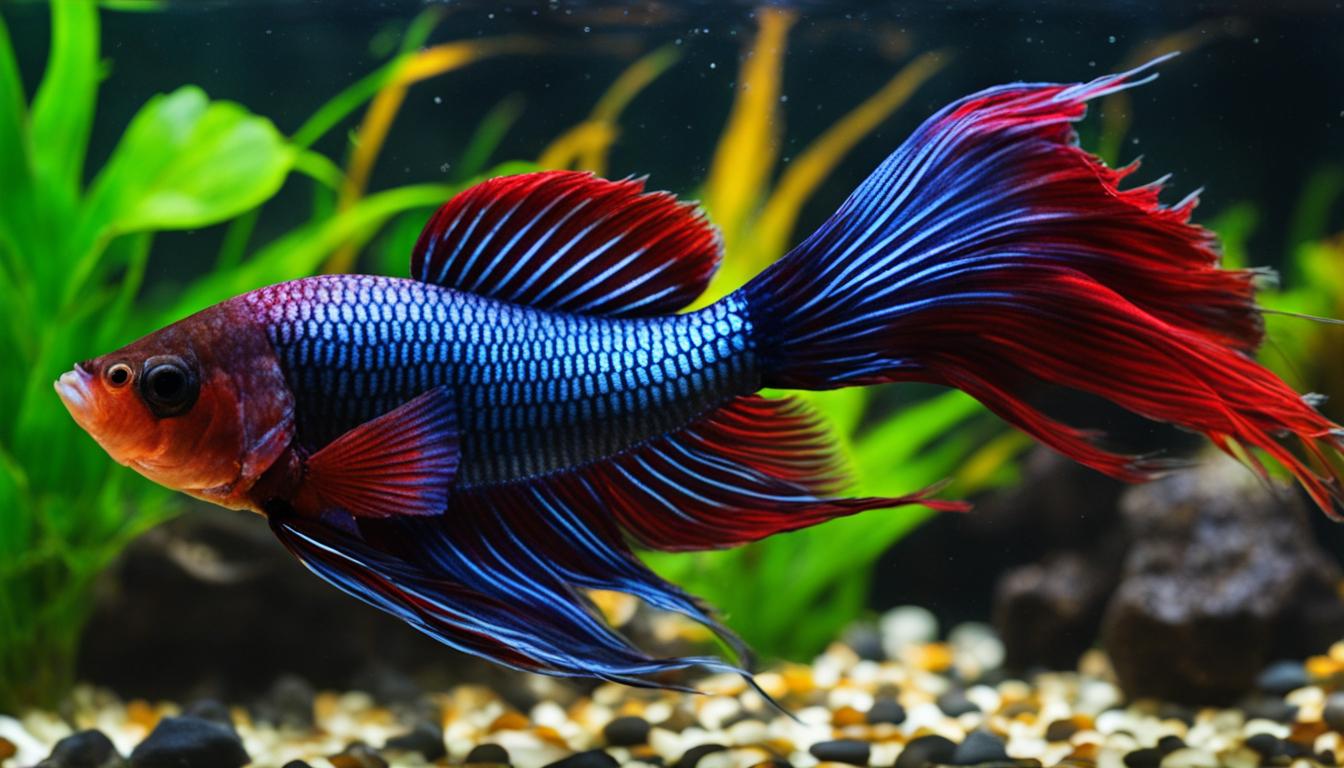Last Updated on 2 years by admin
If you’re a betta fish owner, you know how important it is to maintain a healthy environment for your finned friend. One of the key components of betta fish care is ensuring that their water quality is optimal. This is where water conditioner comes in.
Water conditioner is a vital tool in maintaining the water quality in your betta fish tank. It removes harmful chemicals and toxins from tap water, making it safe for your betta fish to live in. However, it’s essential to use the proper techniques when introducing water conditioner to your betta fish tank.
In this comprehensive guide, we’ll walk you through the steps of using water conditioner for betta fish care. You’ll learn the importance of water conditioner, how to choose the right kind, preparing it for use, introducing it to your betta fish tank, and maintaining water quality for your betta fish. With these tips, you’ll be able to create an optimal environment for your finned friend to thrive in.
Key Takeaways:
- Water conditioner is essential for maintaining the water quality in your betta fish tank.
- Choose the right water conditioner based on your tank size, water parameters, and the specific needs of your betta fish.
- Properly prepare and measure the correct dosage of water conditioner before introducing it to your betta fish tank.
- Regular monitoring and maintenance are necessary to maintain optimal water quality for your betta fish.
- Caring for betta fish involves attention to detail and regular maintenance to create the ideal habitat for your beloved finned friend.
Understanding the Importance of Water Conditioner for Betta Fish
When it comes to betta fish care, maintaining good water quality is crucial. Poor water conditions can lead to stress, illness, and even death for your betta fish. This is where water conditioner comes in. It’s an essential component of betta fish care that helps ensure optimal water quality.
Unlike tap water, which may contain harmful chemicals such as chlorine and chloramines, water conditioner neutralizes these compounds, making the water safe for your betta fish. It also helps regulate the pH levels, ensuring they remain at a level that’s suitable for your fish’s well-being.
Besides providing safe and healthy water conditions, using water conditioner also helps reduce the risk of diseases and infections. Betta fish are prone to various illnesses and infections, and poor water quality only exacerbates these problems. By using water conditioner regularly, you’ll be creating an environment that keeps your betta fish healthy and happy.
Betta Fish Water Quality
The quality of water in your betta fish tank is a crucial aspect of their care. Betta fish are sensitive creatures, and poor water conditions can lead to stress, infections, and diseases. Maintaining optimal water quality requires a combination of factors, including using a water conditioner, regular water changes, and monitoring the water parameters regularly.
To ensure your betta fish’s water quality remains optimal, you’ll need to keep an eye on several parameters, including pH, temperature, and ammonia levels. These parameters can affect your betta fish’s health significantly, so it’s essential to monitor them regularly.
Betta Fish Water Treatment
Water treatment is critical when it comes to betta fish care. It ensures that the water is suitable for your betta fish to live in, free from harmful chemicals and toxins. Water treatment involves using a water conditioner to neutralize any harmful compounds present in the tap water.
Some water conditioners are designed to remove specific compounds, such as chlorine and chloramines, while others also contain beneficial bacteria that help break down waste products in the tank. Choosing the right water conditioner for your betta fish is crucial, as it can affect their overall health and well-being.
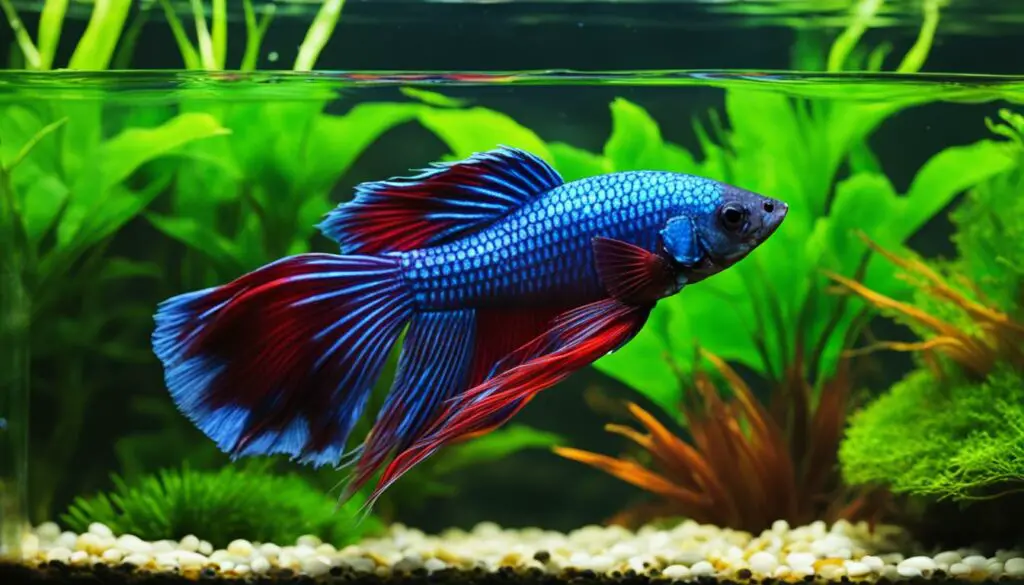
Betta fish are beautiful and fascinating creatures that require proper care and attention. By understanding the importance of water conditioner and its role in maintaining optimal water quality, you’ll be able to provide your betta fish with a clean, safe, and healthy environment that promotes their well-being.
Choosing the Right Water Conditioner for Your Betta Fish
Choosing the right water conditioner for your betta fish is an essential step towards ensuring their health and well-being. With so many options available in the market, it can be overwhelming to pick the right product. Here are some key factors to consider when selecting a water conditioner for your betta fish:
| Factor | Considerations |
|---|---|
| Tank size | Different water conditioners are recommended for different tank sizes. Be sure to choose one that suits your tank capacity. |
| Water parameters | Check your tap water’s pH level, hardness, and chlorine content. Select a water conditioner with the right formula to balance these parameters effectively. |
| Betta fish needs | Consider any specific needs your betta fish may have. For example, if your fish has a sensitive respiratory system, choose a water conditioner that reduces the gas exchange, such as those with aloe vera extract. |
When in doubt, consult with a professional at your local pet store or an experienced betta fish keeper. Don’t forget to read product reviews and compare prices to ensure you make an informed decision.
Once you have selected the right water conditioner for your betta fish, be sure to follow the instructions on the label carefully. Using the wrong dose or frequency can harm your fish and have adverse effects on the tank environment.
Pro tip: If possible, opt for a water conditioner that also detoxifies heavy metals and ammonia, as these can build up in the tank and harm your betta fish over time.
Preparing the Water Conditioner for Use
Now that you have chosen the ideal water conditioner for your betta fish tank, it’s time to make it ready for use. Before adding it to the tank, follow these steps:
- Shake the bottle carefully before use to ensure the contents are well-mixed
- Measure the required amount of conditioner by following the instructions on the label. Remember, the dosage varies depending on the tank size and water quality.
- Add the conditioner to the water, and stir it well to distribute it evenly. You can use a clean and sanitized tool, such as a spoon or a pipette, to accomplish this task.
It’s vital to keep your betta fish tank clean and free from any residues. After adding the conditioner, make sure to rinse the tool thoroughly with clean water and dry it carefully before storing it. Be wary of any spills, and clean them up immediately.
Once the conditioner is added to the water, let the water stand for a few minutes to allow it to take effect. During this time, you can change the filter media, clean the tank decor, and prepare the tank for your betta fish’s return.
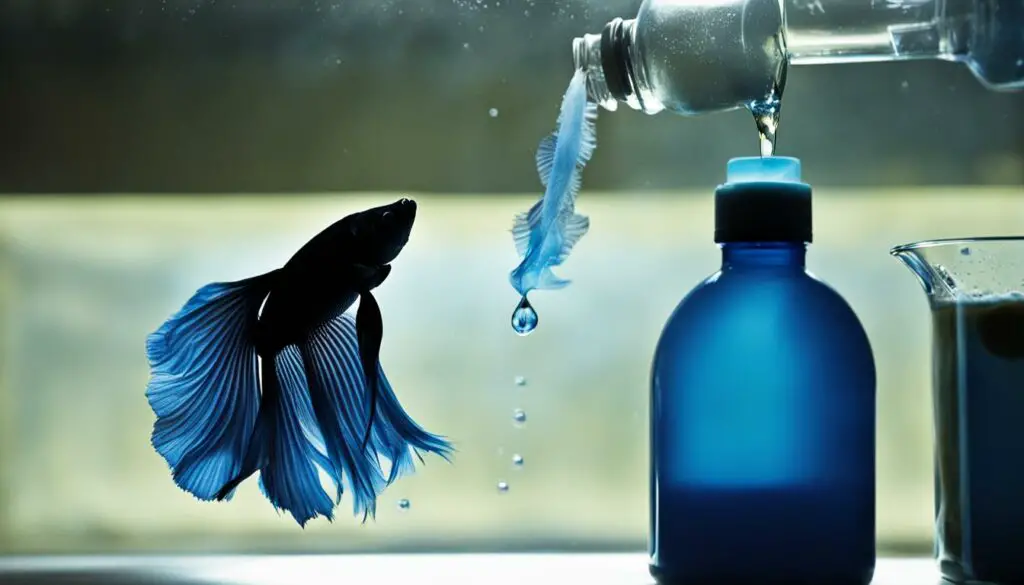
Remember to use the water conditioner every time you change the water in the tank or top it up. This will ensure that your betta fish remains healthy and happy in their environment.
Introducing the Water Conditioner to Your Betta Fish Tank
Now that you have prepared the water conditioner, it’s time to introduce it to your betta fish tank. Follow these simple steps to ensure safe and effective use:
- Turn off all equipment in the tank, including filters, heaters, and air pumps. Chemical reactions can occur when water conditioner mixes with chlorine or other chemicals found in tap water, and turning off the equipment can help minimize the effects.
- Measure the correct dosage of water conditioner according to the instructions on the label.
- Slowly pour the water conditioner into the tank. Avoid adding it directly to the betta fish or plants to prevent damage.
- Wait for at least five minutes, allowing the conditioner to mix with the water. During this time, you can check the temperature and adjust it if necessary.
- Turn on the equipment and let it run for at least 15 minutes before returning the betta fish to the tank.
It’s essential to follow these steps carefully to avoid any harm to your betta fish. While water conditioner is generally safe, improper use can lead to adverse effects on your betta fish’s health and well-being. Ensure to take the time to prepare the water conditioner correctly and introduce it with care.
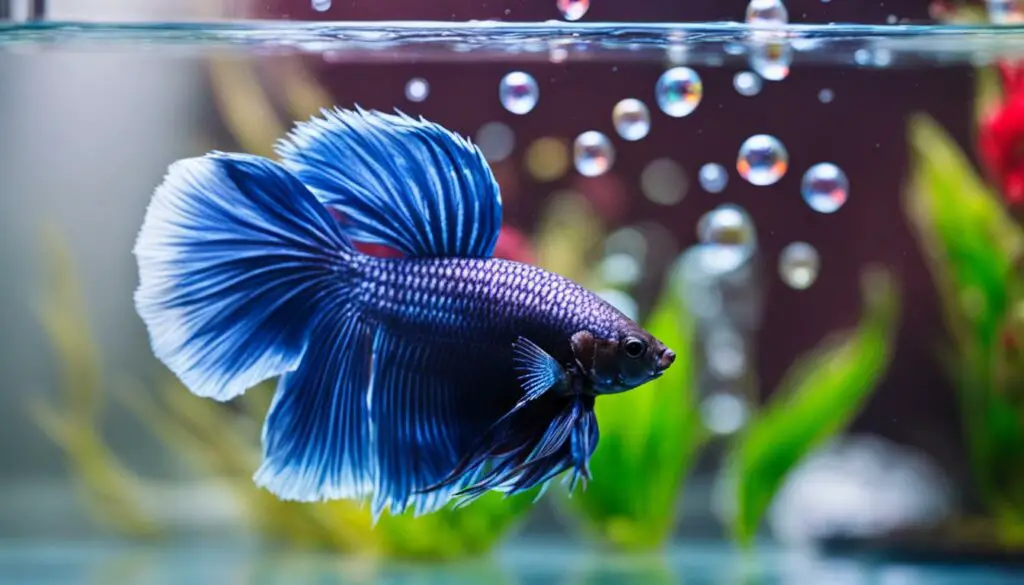
Expert Tip: After adding the water conditioner, test the water parameters before returning the betta fish to the tank. Use a water testing kit to check for any changes in pH, ammonia, and nitrate levels. It’s also a good practice to monitor your betta fish closely for the next few hours to ensure they are not exhibiting any adverse reactions.
Now that the water conditioner is in the tank, it’s essential to maintain it correctly to ensure your betta fish’s health. In the next section, we will discuss monitoring and maintaining water quality in your betta fish tank.
Monitoring and Maintaining Water Quality
Using a water conditioner is a vital step in maintaining the water quality of your betta fish tank, but it’s not a one-and-done task. Regular monitoring and maintenance are necessary to keep your betta fish healthy and happy. Here are some things to keep in mind:
- Betta fish tank maintenance: Regular tank maintenance is critical to keep the water clean and fresh. This includes changing the water every week, removing any uneaten food or debris from the tank, and cleaning the tank walls and decorations with a gentle aquarium-safe cleaner. Remember to use a net when removing your betta fish from the tank during cleaning.
- Betta fish water quality: Besides using a water conditioner, it’s essential to monitor the water quality of your betta fish tank regularly. This includes testing the water for ammonia, nitrite, and nitrate levels using a water testing kit. Keep the water parameters within the recommended range for betta fish to prevent health problems.
- Betta fish health: Monitoring the behavior and appearance of your betta fish can also provide valuable insights into their overall health. Watch for any signs of stress, such as sluggishness, loss of appetite, or unusual swimming patterns. Also, keep an eye out for any signs of illness, such as discoloration, fin rot, or parasites, and take appropriate action immediately.
To make monitoring and maintenance easier, keep a log of your betta fish tank’s water and maintenance history. This can help you identify any patterns or issues that need to be addressed and serve as a useful reference for future maintenance tasks.
Table: Recommended Water Parameters for Betta Fish
| Parameter | Ideal Range |
|---|---|
| pH | 7.0 – 7.5 |
| Ammonia (NH3) | 0 ppm (parts per million) |
| Nitrite (NO2) | 0 ppm |
| Nitrate (NO3) | 20 ppm or less |
By following the recommended water parameters for betta fish, you can ensure your finned friend’s optimal health and happiness. Remember to perform regular maintenance and keep an eye on your betta fish, and they’ll thrive in their clean and healthy environment.
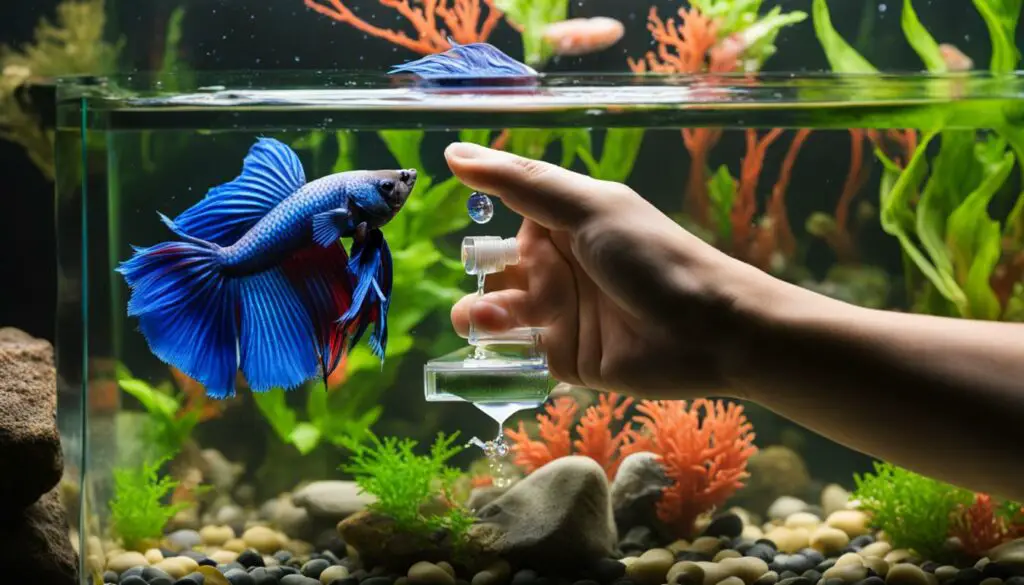
Additional Tips for Betta Fish Care
Proper betta fish care requires attention to detail and regular maintenance to create the ideal habitat for your beloved finned friend. Here are some additional tips to ensure the overall well-being of your betta fish:
- Feeding: Betta fish are carnivorous and need a protein-rich diet. Feed them small portions of high-quality food, such as brine shrimp, bloodworms, or pellets, once or twice a day. Avoid overfeeding, which can lead to digestive problems and a dirty tank.
- Tank Setup: Make sure your betta fish has a spacious and stimulating environment. Provide hiding places, such as plants or decorations, and avoid exposing them to direct sunlight or strong currents. Keep the water temperature between 75-80°F and perform regular water changes.
- Maintaining a Stimulating Environment: Betta fish are intelligent and enjoy having toys and objects to interact with. Add floating toys or a mirror, which can provide entertainment and exercise for your betta fish.
- Observation: Regularly observe your betta fish for any signs of illness or distress. Look for changes in behavior, appetite, or physical appearance. Early detection of health problems can help you provide proper care and treatment to your betta fish.
Following these tips will help you maintain a healthy and happy betta fish. Remember to always provide the proper care and attention to your aquatic pet, and they will reward you with their vibrant colors and playful personalities.
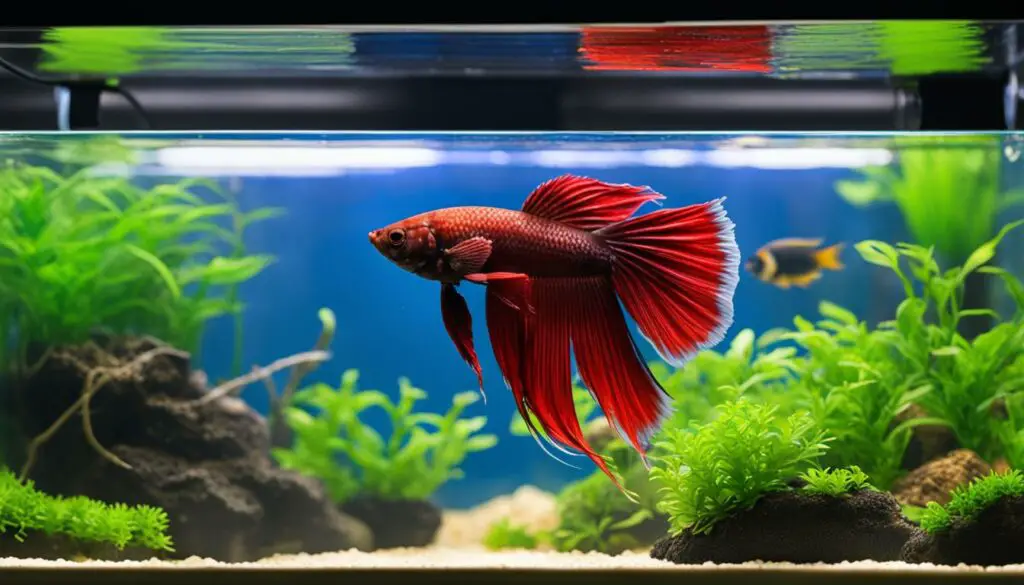
Troubleshooting Common Water Conditioner Issues
Using a water conditioner is a crucial step in maintaining a healthy and safe environment for your betta fish. However, sometimes things may not go as planned, and certain issues may arise. Here are some common problems you may encounter when using water conditioner for your betta fish and how to troubleshoot them:
Cloudy Water
If your betta fish tank’s water becomes cloudy after using a water conditioner, don’t panic. Cloudy water is a common issue that can be caused by a bacterial bloom, high levels of dissolved organic matter, or overfeeding. Here are some steps to clear up cloudy water:
- Perform a partial water change
- Vacuum the gravel bed to remove any uneaten food or debris
- Reduce the amount of food you are feeding your betta fish
- Ensure you are not overstocking the tank with too many fish
By implementing these steps, you should see your betta fish’s water become clear once again.
Unusual Odors
If you notice an unusual smell coming from your betta fish tank after using water conditioner, there may be a few reasons why. It could be a sign of a bacterial infection, overfeeding, or a lack of water changes. Here are some steps to address the issue:
- Perform a partial water change
- Check your betta fish for signs of illness
- Reduce the amount of food you are feeding your betta fish
- Ensure you are not overcrowding the tank with too many fish
If the smell persists, it may be necessary to consult with a veterinarian who specializes in fish care.
Loss of Fish
If you notice that your betta fish is not thriving after using water conditioner, there may be an underlying issue that needs to be addressed. Here are some possible reasons why your betta fish is struggling:
- Water parameters are out of balance
- The tank is overcrowded
- Your betta fish is sick
- You are using the wrong type of water conditioner
If you suspect that your betta fish may be sick or injured, it’s best to consult with a veterinarian who specializes in fish care. They can help you identify the issue and recommend an appropriate course of treatment.
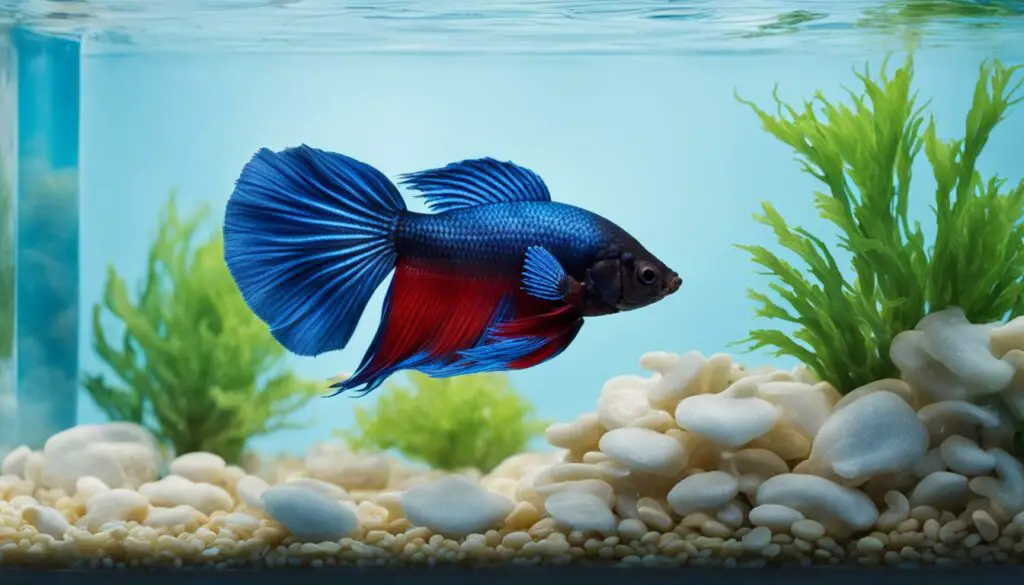
By following the steps outlined in this guide, you should be able to use water conditioner for your betta fish with confidence. If you do experience any issues, don’t hesitate to address them promptly. Regular maintenance and monitoring are key to ensuring your betta fish’s ongoing health and happiness.
Expert Recommendations for Water Conditioner Usage
When it comes to using a water conditioner for betta fish, it’s essential to follow the instructions carefully. Here are some expert recommendations to keep in mind:
1. Choose a high-quality water conditioner that is safe for betta fish
The type of water conditioner you choose can have a significant impact on the health of your betta fish. Look for a product that is formulated specifically for betta fish and free of harmful chemicals. Always read the label and follow dosage instructions closely.
2. Test your water regularly
One of the best ways to ensure the effectiveness of your water conditioner is to test your water regularly. Use a testing kit to measure the pH, ammonia, nitrite, and nitrate levels in your betta fish tank. This will help you identify any potential issues early on and take corrective action before they become a problem.
3. Perform regular water changes
Even with the use of a water conditioner, it’s still important to perform regular water changes to maintain optimal water quality. As a general rule, aim to change 25% of the water in your betta fish tank each week. This will help remove any excess waste and contaminants that can harm your fish.
4. Keep your betta fish tank clean
Along with regular water changes, it’s important to keep your betta fish tank clean. Use a gravel siphon to remove any debris from the bottom of the tank, and clean any decorations or plants to prevent the buildup of harmful bacteria.
5. Follow a proper feeding schedule
Overfeeding your betta fish can lead to excess waste and poor water quality. Follow a proper feeding schedule, providing only the amount of food your fish can consume in a few minutes. Additionally, avoid overfeeding live or frozen food, as it can quickly spoil and lead to water quality deterioration.
By following these expert recommendations, you can ensure the proper use of water conditioner and maintain a healthy environment for your betta fish. Remember, consistent care and attention are key to ensuring the well-being of your finned friend.
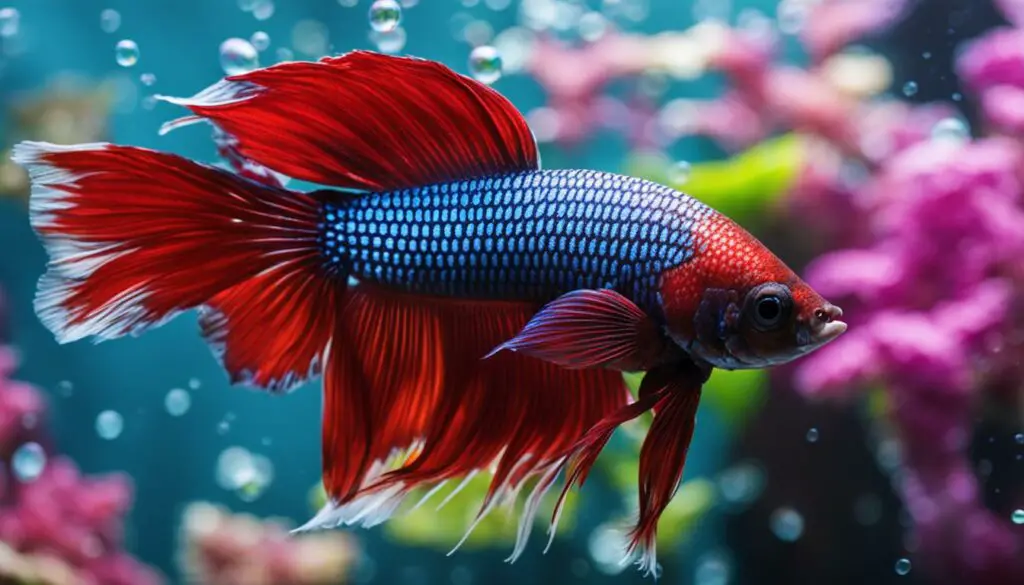
Conclusion
In conclusion, water conditioner is an essential component of betta fish care, contributing to their overall health and well-being. By understanding the importance of water quality, selecting the right water conditioner, preparing and introducing it to your betta fish tank, monitoring and maintaining water quality, and incorporating additional tips for betta fish care, you can provide your beloved finned friend with a clean and healthy environment.
Remember to stay vigilant and keep an eye out for any unusual behavior or changes in water quality, so you can quickly address any issues that arise. By following the expert recommendations and troubleshooting tips, you can ensure your betta fish remains happy and healthy.
Always Be Mindful of Betta Fish Care
As with any pet, proper care is crucial to ensuring a happy and long life for your betta fish. Take the time to research and educate yourself on the best practices for betta fish care, and don’t be afraid to ask for help or advice from experienced betta fish owners and professionals.
By dedicating yourself to providing the best possible care for your betta fish, you can create a rewarding and fulfilling experience for both you and your finned friend.
FAQ
How often should I use water conditioner for my betta fish?
It is recommended to use water conditioner every time you perform a water change or add new water to your betta fish tank. This helps to remove harmful chemicals and toxins, ensuring a safe and healthy environment for your betta fish.
Can I use tap water without a water conditioner for my betta fish?
No, it is not advisable to use tap water without a water conditioner for your betta fish. Tap water often contains chlorine, chloramine, and heavy metals that can be harmful to your betta fish. A water conditioner will neutralize these chemicals and make the water safe for your fish.
How much water conditioner should I use for my betta fish tank?
The dosage of water conditioner depends on the size of your betta fish tank. Generally, you should follow the instructions provided by the manufacturer. As a guideline, adding 1 drop of water conditioner per gallon of water is a common recommendation.
Can I overdose on water conditioner?
Overdosing on water conditioner can be harmful to your betta fish. It is important to follow the instructions provided by the manufacturer and not exceed the recommended dosage. Using too much water conditioner can disrupt the balance of the tank’s ecosystem and potentially harm your fish.
How long should I wait after adding water conditioner before putting my betta fish back into the tank?
After adding water conditioner to your betta fish tank, it is recommended to wait for at least 15-20 minutes before reintroducing your fish. This allows the water conditioner to fully take effect and ensures that any residual chemicals are neutralized.
Can I use a water conditioner specifically designed for other fish species on my betta fish?
It is best to use a water conditioner specifically formulated for betta fish. Betta fish have unique requirements, and using a water conditioner designed for other fish species may not provide the optimal treatment for your betta fish’s needs.
How long does a bottle of water conditioner last?
The lifespan of a bottle of water conditioner depends on the size of your betta fish tank and how frequently you perform water changes. Generally, a bottle of water conditioner can last for several months or even longer with proper usage.
Can I use distilled water instead of tap water for my betta fish tank?
It is not recommended to use distilled water alone for your betta fish tank. Distilled water lacks essential minerals and nutrients that betta fish need to thrive. It is best to use a combination of tap water treated with a water conditioner to ensure a suitable environment for your fish.
Is it normal for the water to turn cloudy after adding water conditioner?
It is not uncommon for the water to temporarily turn cloudy after adding water conditioner to your betta fish tank. This cloudiness usually dissipates within a few hours. However, if the cloudiness persists or worsens, it may indicate an issue with water quality or excessive use of water conditioner. In such cases, it is advisable to seek further guidance.
Can I use expired water conditioner for my betta fish?
It is not advisable to use expired water conditioner for your betta fish. Expired water conditioner may have lost its effectiveness in neutralizing chemicals and providing the necessary treatment for your fish. It is best to use fresh water conditioner to ensure the health and well-being of your betta fish.

